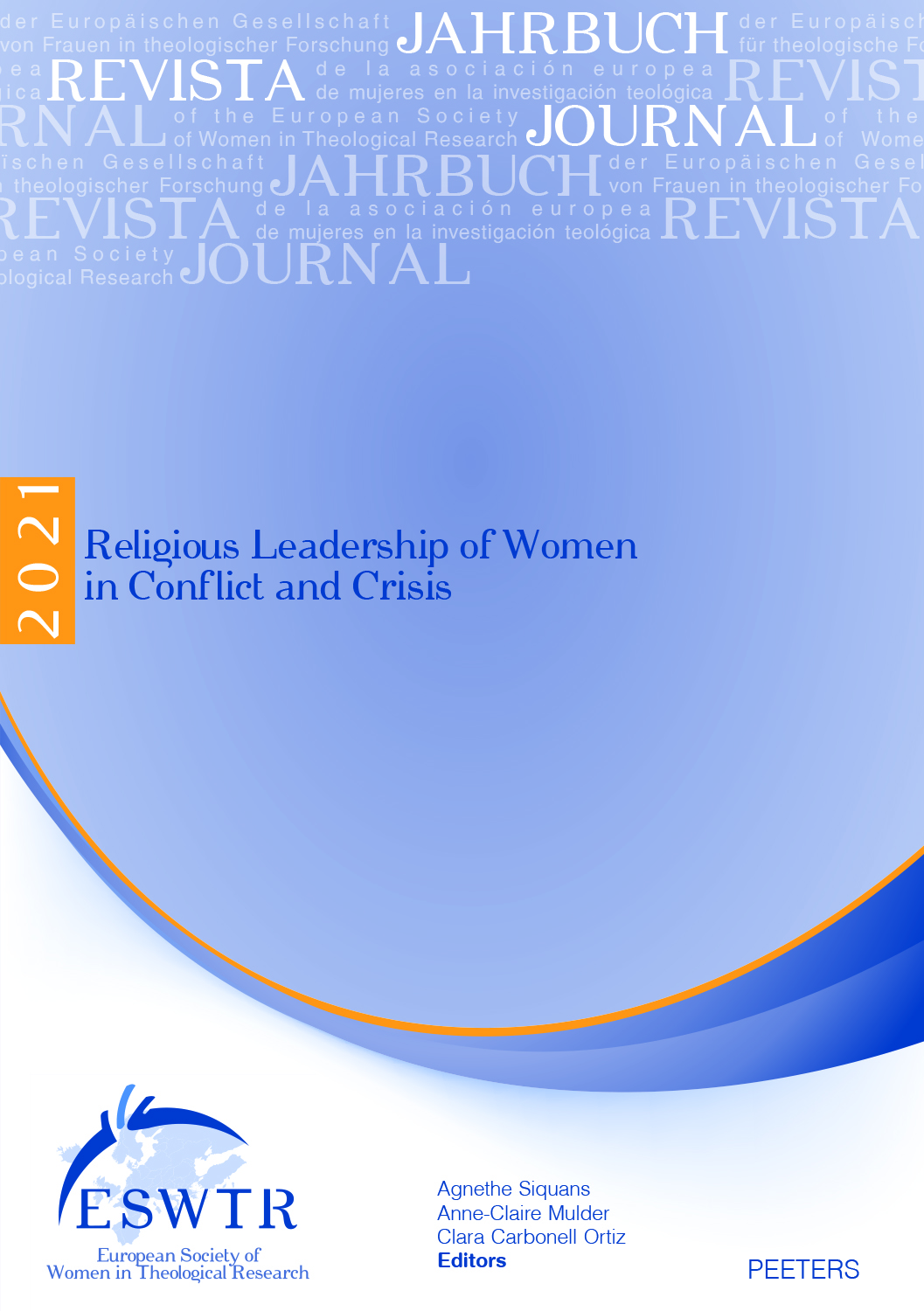 previous article in this issue previous article in this issue | next article in this issue  |

Preview first page |
Document Details : Title: Un Dios que salva Subtitle: Necesidad de un cambio de paradigma en la reflexión sobre el pecado Author(s): BARACCO COLOMBO, Adelaide Journal: Journal of the European Society of Women in Theological Research Volume: 23 Date: 2015 Pages: 67-83 DOI: 10.2143/ESWTR.23.0.3103632 Abstract : El concepto de salvación responde por un lado, al profundo anhelo de posesión del Bien y por el otro, a la experiencia del Dios liberador. La reflexión teológica clásica sobre este tema se mueve dentro de un paradigma anti-ecológico y escasamente teo-lógico: individualista, legalista y transmisor de un Dios enojado/castigador. Es absolutamente necesario un cambio de paradigma, en clave ecológico-mística: inter-relacional y experiencial, que nos hable de un Dios experimentado como Amor Incondicional y liberador. El paradigma clásico responde a una visión patriarcal, cuya premisa básica es el 'honor' y 'poder' de un Dios herido por el 'orgullo' y la 'rebelión' de los seres humanos. La perspectiva teológica de pecado-redención se concentra en el 'sacrificio' de Jesús, cuyo sufrimiento inocente hace que su muerte sea aun 'más' redentora. La salvación es un asunto esencialmente individual. En cambio, la mística femenina – y más específicamente Juliana de Norwich – nos ofrece un paradigma radicalmente diferente, que podríamos definir ecológico-místico, y cuya perspectiva es holística e integradora. En el centro está el Amor creador que sostiene a la creación con su Espíritu; el pecado no es rebelión sino debilidad y ceguera; la antropología subyacente es neumática y su perspectiva es la de la bendición-divinización; la Encarnación es la epifanía de la profunda dignidad de la condición humana; Cristo es la Madre de la Humanidad, y su Maternidad amorosa se expande hacia afuera para abrazar a toda la creación. Las intuiciones de la mística, casi ignoradas por la teología, ofrecen la posibilidad de un cambio de paradigma, desde los conocidos modelos patriarcales hacia otros más coherentes con el Dios vivido y proclamado por Jesús y, por esto mismo, auténticamente liberadores. The concept of salvation responds, on the one hand, to the deep human longing to possess the Good, and on the other, the experience of a liberating God. The classical Christian theological reflection on this issue moves into an anti-ecological paradigm and also a not so theo-logical one: it is individualistic, legalistic, and speaks of an angry and punishing God. A paradigm shift in an ecological-mystical key, interrelational and experiential, is thus urgently needed, a paradigm that speaks of a God-Love that is unconditional and truly liberating. The classical paradigm responds to a patriarchal view where the basic premise is the 'honor' and 'power' of God that is wounded by human 'pride' and 'rebellion'. The theological perspective is that of sin-redemption, concentrated in the 'sacrifice' of Jesus on the cross and on his innocent suffering, which makes his death 'more' redemptive yet. Salvation is understood essentially in legalistic and individualistic terms. On the other hand, feminine mysticism – more specifically Julian of Norwich – reveals a radically different paradigm, which could be defined as ecological-mystical and whose perspective is holistic and integrative. In the center is Love, which builds, sustains and enlivens all creation with His Spirit; sin is not rebellion but weakness and blindness. The underlying anthropology is pneumatic, and its perspective is blessing-divinization, and incarnation is the epiphany of the profound dignity of the human condition. Christ is the Mother of Humanity, and her Loving Motherhood expands outward to include all creation. Mysticism’s insights, almost ignored by theology, offer the possibility of a paradigm shift from known patriarchal models to new ones that are more consistent with the God lived and proclaimed by Jesus, and, for that matter, really liberating. Das Konzept der Erlösung antwortet einerseits auf ein tiefes menschliches Verlangen danach, das Gute zu besitzen, und andererseits auf die Erfahrung eines befreienden Gottes. Die klassische christlich-theologische Reflektion bewegt sich in einem anti-ökologischen Paradigma, das auch wenig theologisch ist. Es ist individualistisch, legalistisch und spricht von einem wütenden, strafenden Gott. Ein Paradigmenwechsel in eine ökologisch-mystische Richtung, die beziehungshaft und erfahrungsbezogen ist, ist daher dringend nötig; ein Paradigma, das von Gott-Liebe, die bedingungslos und wirklich befreiend ist, spricht. Das klassische Paradigma entspricht einer patriarchalen Sicht, die auf der Ehre und Macht Gottes beruht, die von menschlichem Stolz und Rebellion verletzt wurden. Die theologische Perspektive ist die von Sünde-Erlösung, die auf das Opfer Jesu am Kreuz und sein unschuldiges Leiden fokussiert ist, durch die sein Tod sogar noch erlösender ist. Erlösung wird vor allem legalistisch und individualistisch verstanden. Weibliche Mystik dagegen, hier im besonderen Julian von Norwich, eröffnet ein radikal anderes Paradigma, das als ökologisch-mystisch definiert werden könnte und dessen Perspektive holistisch und integrativ ist. Im Zentrum steht die Liebe, die die ganze Schöpfung mit ihrem Geist aufbaut, erhält und belebt. Sünde ist nicht Rebellion, sondern Schwäche und Blindheit. Die zugrunde liegende Anthropologie ist pneumatisch und in Segen und Deifikation begründet, und Inkarnation ist die Erscheinung der tiefen Würde der menschlichen Situation. Christus ist die Mutter der Menschheit und ihre liebende Mutterschaft dehnt sich über die ganze Schöpfung aus. Die Einsichten der Mystik, von der Theologie fast ignoriert, bieten die Möglichkeit für einen Paradigmenwechsel vom patriarchalen Modell zu neuen Paradigmen, die eher mit dem in Jesus gelebten und verkündeten Gott übereinstimmen und wirklich befreiend sind. |
 |


